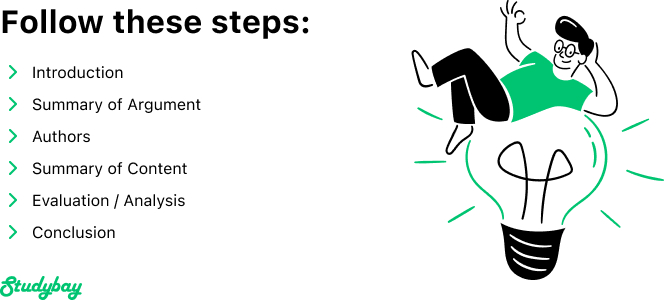
12 min
5
10.04.2022

Academic book evaluations help improve the credibility of a published book. It is popular among arts and social sciences since scientific research and write-ups are often published in academic journals. It is also a way of ensuring the academic knowledge never gets impoverished for lack of materials that can be referred to for modern problems.

Reviewers are also keen on identifying biases that the author may have expressed in their books.
What Is an Academic Book Review?
Simply put, it is a critical assessment of contents before getting published in an academic journal. With these reviews, students get to contribute to the academic profession. When writing an academic book review, professors often provide detailed guidelines to help students understand what is expected.
Students have to read the contents of books they are about to review. While at it, you create notes that you use in evaluating the text. Depending on your notes, give relevant recommendations to such works.
Academic reviews of books are often done by knowledgeable people in the niche. For example, if you are an art student, your professor will not give you a scientific text to review.
Scholarly Book Review Format
The reviews are specific and do not involve rewriting all the chapters written by the author. Instead, they focus on giving opinions of what the author ought to have overlooked while writing and those they overstated. If you have an assignment, here is how to write an academic book review:
Introduction
It includes the book's title to be reviewed, which includes the bibliography. The ISBN is also included in this section. Some reviewers also provide the book's pricing, but that can always be checked from the retailers.
Depending on the type of book, students can also write a thesis on this part. But, not all can have a thesis. Some, like poetry and fiction, can be difficult.
If the author has other published works, you can mention them here and compare them. Some authors publish unrelated genres, which is why it is important to compare their different works.
Body
Here is where you criticize the author's work. Since a text evaluation is not meant to dismiss the author's work, mention their strengths, weaknesses, and if you find some bias, do not avoid mentioning it.
A book review paper should show your independent thinking. That is, after reading and compiling notes, your recommendation of the book should be written on this part. It is also a way of showing mastery of the topic.
When writing the body, always quote some parts of the book's chapters. It shows you have actually read and understood its contents.
Conclusion
An academic review format cannot be complete without this section. Your conclusion should be brief since you will have discussed the text in the body. This part is not where you introduce new ideas since readers will be expecting nothing new at this point.
Restate the book's overall impression and your recommendations. After concluding, list the references using the academic book review guidelines on the type of referencing provided by your university.
Example of an Academic Book Review
Some students confuse writing a scholarly review with a research paper. A scholarly book review format is different from that of a research paper writing. It has specific elements that university tutors are keen on looking. Here is how to write a scholarly book review:
The scholarly book review example below was done by a history student of 'Hilter's Decision to Invade USSR,' chapter 7 (pp 81-92).
During a dinner in August 1941, Hitler is again on another talk where he discusses lawyers, their potential prey, and corporal punishment. Using an analogy of the moors owners taking care of the game they will kill during the shooting season, Hitler compares the lawyers taking care of the criminal class.
On the night of 19th August 1941, Hitler is at another talk discussing the virtues of war and autocracy in Europe. In this talk, Hitler is depicted as a person who is madly in love with wars and building of a fortified German army. In his suggestion, which is presented here as a wish, Hitler urges the German people to embrace war after every fifteen to twenty years. In defending his stance, he says that an army whose sole intention is to preserve peace is like playing with soldiers. I think Hitler clearly underestimated the power and resourcefulness of his target.
The academic book review example above shows how the student summarizes Hitler's obsession with war and victory. Hitler views his soldiers as pillars to his success in the attack. The summary is critical, and the student gave the recommendation after reading the chapter.
Main Steps to Write an Academic Book Review
An academic book review template makes the review process more straightforward. Most universities provide these to their students so they can focus on the review process. The evaluations are often short, approximately 100 – 1500 words. Students can follow these steps on how to write a book review university professors love:

Introduction
Great examples of scholarly book reviews have attention-grabbing introductions. Ensure yours will want your professor to continue reading your opinions of the book. Here, write a general description of the book and indicate whether the author's ideas are valid.
Questions you can answer in this section are whether the author is consistent with the book's topic. And whether they have been biased in some chapters or throughout the book.
Summary of Argument
This part depends on the type of audience you will be representing your reviews to. For example, if you are writing for a student audience that depends on this section for their exam preparation, you might want to be a bit detailed.
Otherwise, an audience that is familiar with the book's contents may not require as many details. The summary is short and should portray your analysis of the book. Use evidence from the book to back up some of your arguments. Be careful not to quote so much to avoid having a lengthy summary section.
Authors
Recognize the book's author/s and editors. It helps prevent controversies that arise from using other people's work without permission. Write about their background, area of specialization, other works (if any), and how many years they have been doing the research work or whether they are new entrants in that research area.
Summary of Content
An example of academic book review that is done well summarizes the book's content ingeniously. It mentions the research, data collection and analysis methods used, setbacks, and recommendations.
Evaluation/Analysis
This is where the weight of your review lies. Organize your thoughts into paragraphs to make it easier for your audience to follow. If the book review template university has provided is for single aspects or a few chapters, evaluating using paragraphs is faster.
But, when reviewing the whole book, the process can be a bit time-consuming. Your text evaluation should not focus on having the chapters follow each other. You can end up with a bulky review that almost looks like a book rewrite.
Consider organizing your argument into themes or other elements that make it easier to analyze the book. Quote its contents to support your arguments.
You can compare the book with others if it is relevant to your review. However, ensure you remain within the scope of the main book to maintain its relevance.
Also, you appreciate mentioning the areas you think the author has done a splendid job. If you think the book can be improved, do not fail to mention this as part of the weaknesses. It could be omitted details, incorrect information, and other weaknesses.
Conclusion
This is where you summarize your review with a concluding statement. Write about how the work contributes to the field of study and whether it provides room for future research. If you had identified limitations for the work, mention them too.
Consider identifying types of audiences that can benefit from your evaluation. This aspect is important because some readers directly go to the summary section to see if the book is relevant to them or not. While concluding, never mention whether you have liked or disliked the book because it will make your review biased.
Making a Plan
Tutors usually have a turnaround for book review assignments to allow them to go through each. If, for example, you have been given 18 weeks to submit the work, you can plan your schedule to ensure you deliver within the timeline. Here is a typical example of a practical plan:
Session 1: 1st Week to week 9
- Choosing a book to review
- Introducing the book for approval
- Outlining the topic and categorizing the book
- Important questions to answer when reviewing the book
- Elements of a great book review
Session 2: Week 10 to week 17
- Writing the first draft
- Identifying challenges while writing the book review
- Comparing and discussing notes taken while reading with other reviewers
- Getting feedback and revising the draft
Session 3: Week 18
- Submitting the final draft
Good Questions While Reading
When thinking about how to write a good academic book review, you ought to ask yourself some questions. These help you have a clear understanding of what to write. Check this example of a scholarly review question outline:
- Who has been credited for writing the book?
- Is the book consistent with the topic and its plot?
- Is the book relevant in the field it has been categorized?
- Are the arguments believable?
- Are there other books with similar content?
- Has the author provided up-to-date and valuable content?
- Who is the targeted audience for the content?
- Has the author used good formatting of the book, and do the ideas flow logically?
- What are the strengths and weaknesses portrayed in the book?
The questions are unlimited. If you feel like you need a longer list, consider looking for inspiration from other reviewers. You can get an academic book review sample from your university library to have an idea of what reviewers mostly focus on.
Writing an Academic Book Review
An academic book review is not necessarily challenging as some students make it look. The trick is to avoid adding irrelevant information and follow guidelines provided by your tutor. Here are some tips on how to write scholarly book review:
- Read the book before attempting to write anything. Some students like playing smart and only read the synopsis provided by the author. This alone is not enough to write a publication assessment. If you are interested in how to write a book review university professors will want to read, read the whole book. It is how you get quotes and enough content for your review.
- Organize your work. Never submit a text evaluation with disorganized paragraphs and thoughts. It creates a bad impression of your work, no matter how much time you spend on it. Ensure the paragraphs flow coherently and are well organized.
- Give your opinion. The essence of writing a publication assessment is not providing a summary of the author's work. Show some understanding by commenting on what you think is lacking or is presented exceptionally well.
- Do not quote the book too much. Although quotes are proof you have read and understood the book, using too many of them shows a lack of confidence and evaluation skills.
- Do not over criticize the book. The author cannot possibly capture all the details in one book. It is practically impossible. Some details are not relevant in the text and do not add value to the readers.
- Never show bias in your review. Instead of writing "I don't like the book because…or I like the book because…." Consider citing it as a weakness or strength.
- Need reliable book review helper? Write us! You can buy book review here!
FAQ
What Are the 4 Stages in Writing an Academic Book Review?
The 4 main stages in writing an academic text assessment include: introducing the book, creating an outline of the book's contents, evaluating the argument, and writing a conclusion.
What Are the Main Parts of a University Book Review?
A university publication evaluation has three main parts: the introduction, body, and conclusion. The body is divided into subheadings that make the review more interesting.
How Many Pages Should an Academic Book Review Be?
An academic publication assessment can have 1 – 5 pages. It is because reviews range between 100 – 1500 words, depending on whether the book is being reviewed wholly or just a few chapters.
What Makes a Good Scholarly Book Review?
Several aspects make a scholarly book review great. They include an introduction, summary of arguments, authors, a summary of contents, evaluation/analysis, and the conclusion.



